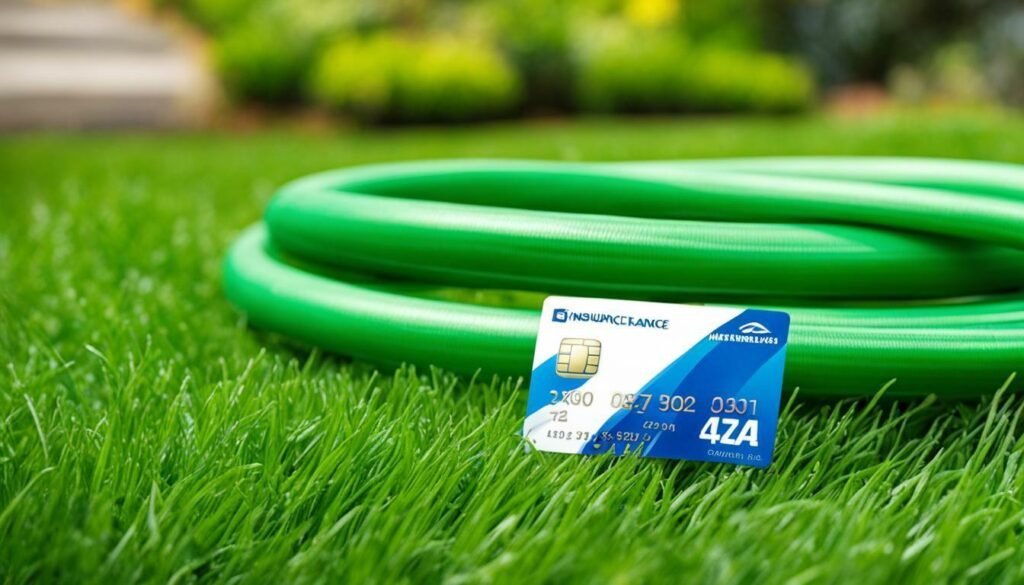Starting a landscaping business requires careful planning and preparation. There are several key steps involved in setting up a successful landscaping business, from deciding on services and equipment to obtaining insurance and licenses. Developing a marketing plan, setting prices, and managing your finances are also essential for long-term success.
To begin, you need to determine what services you want to offer and whether you will rent or buy equipment. Having the necessary tools, such as lawnmowers, trimmers, and shovels, is crucial, but you must also consider the costs of maintaining and upgrading your equipment.
Next, it’s important to obtain the required business insurance, licenses, and Employer Identification Number (EIN). General liability insurance protects you from potential damages or legal fees, and if you have employees, you may need workers’ compensation insurance. Additionally, you must obtain any necessary business licenses for your state and register to pay taxes.
Developing a comprehensive marketing plan is essential for attracting customers to your landscaping business. Setting up a professional website, utilizing social media platforms, and implementing effective search engine optimization strategies can help increase your business’s visibility and reach a wider audience. Additionally, researching your competition and adjusting your prices accordingly will ensure you remain competitive in the market.
Managing your finances is crucial for the long-term success of your landscaping business. Utilizing business apps and software for inventory management, payroll, and accounting can streamline your operations and help you stay organized. Keeping track of your business’s financials and regularly assessing your financial health will enable you to make informed decisions and plan for future growth.
Table of Contents
ToggleKey Takeaways:
- Starting a successful landscaping business requires careful planning and preparation.
- Determine the services you want to offer and consider whether to rent or buy equipment.
- Obtain the necessary insurance, licenses, and EIN to protect your business and comply with regulations.
- Develop a comprehensive marketing plan to attract customers and increase visibility.
- Set prices based on market research and adjust accordingly.
- Manage your finances efficiently using business apps and software.
Before diving into the landscaping industry, it’s essential to decide what services you want to provide and what equipment you’ll need to get started. Whether you choose to focus on maintenance, design, or both, determining your niche will help you attract the right customers and stand out from the competition.
Consider the different services you can offer, such as lawn mowing, tree trimming, garden design, or irrigation installation. Assess your skills, interests, and the demand in your area to identify which services will be most profitable for your business.
Once you’ve determined your services, it’s time to consider the equipment you’ll need to deliver high-quality results. Common landscaping equipment includes lawnmowers, weed trimmers, leaf blowers, shovels, and rakes. Depending on the scope of your services, you may also need specialized equipment like chainsaws, hedge trimmers, or excavators.
Table: Essential Equipment for a Landscaping Business
| Equipment | Usage |
|---|---|
| Lawnmower | Cutting grass to maintain a neat and tidy appearance. |
| Weed Trimmer | Removing weeds from lawns, gardens, and other landscaped areas. |
| Leaf Blower | Cleaning up fallen leaves and debris quickly and efficiently. |
| Shovels and Rakes | Preparing soil, spreading mulch, and leveling surfaces. |
| Chainsaw | Trimming or removing trees and branches. |
Remember, the type and quantity of equipment you’ll need depends on your chosen services. Start with the essentials and gradually invest in additional equipment as your business grows. It’s also important to consider the costs of maintaining and upgrading your equipment, as regular maintenance will ensure your tools are in good working condition and can deliver top-notch results for your clients.

Obtaining Insurance and Licenses
Once you have decided to start a landscaping business, it’s crucial to ensure that you have the required insurance coverage and licenses to protect your business legally. This will help safeguard your assets and provide peace of mind while operating in the industry.
General Liability Insurance: One of the first insurance policies you should consider is general liability insurance. This type of coverage protects your business against claims for property damage or bodily injury caused by your operations. It also covers any legal fees associated with defending your business in a lawsuit. General liability insurance is essential for any landscaping business, as accidents can happen while working on clients’ properties.
Workers’ Compensation Insurance: If you have employees working for your landscaping business, it’s important to obtain workers’ compensation insurance. This coverage provides benefits to employees who suffer work-related injuries or illnesses. It helps cover medical expenses, lost wages, and rehabilitation costs. Workers’ compensation insurance not only protects your employees but also protects your business from potential lawsuits related to workplace injuries.
| Insurance Type | Importance |
|---|---|
| General Liability Insurance | Vital to cover property damage and bodily injury claims |
| Workers’ Compensation Insurance | Protects employees and business from work-related injuries |
Business Licenses: Depending on your state and local regulations, you may need to obtain specific business licenses for your landscaping company. These licenses ensure that you are compliant with local laws and regulations. They may also provide credibility and reassurance to potential clients. Research the requirements in your area and obtain the necessary licenses to operate legally.
Employer Identification Number (EIN): An Employer Identification Number (EIN) is essential for your landscaping business, especially if you have employees or plan to hire them in the future. This is a unique identification number assigned by the IRS for tax purposes. You will need an EIN to file taxes, open business bank accounts, and hire employees. Applying for an EIN is a simple process and can be done online through the IRS website.
By obtaining the necessary insurance and licenses for your landscaping business, you can protect your business, employees, and clients. It’s important to research the specific requirements in your area and ensure compliance with all legal obligations. This will help establish a solid foundation for your business and give you the confidence to provide quality services to your clients.

A well-developed marketing plan is essential for the success of your landscaping business. It helps you attract new customers, stand out from your competitors, and build a strong brand presence. In today’s digital age, effective online marketing strategies are crucial to reach your target audience and generate leads. Here are some key components to consider when developing your marketing plan:
1. Creating a Professional Website
A professional website is your online storefront and the first impression potential customers will have of your business. Make sure your website is visually appealing, user-friendly, and mobile-responsive. Showcase your services, portfolio, and contact information. Use high-quality images and engaging content to highlight your expertise and unique selling points. Don’t forget to optimize your website for search engines to improve your organic rankings.
2. Utilizing Social Media
Social media platforms like Facebook, Instagram, and LinkedIn offer great opportunities to connect with your target audience and build brand awareness. Identify which platforms your potential customers are using and create engaging content to share. Regularly post about your services, projects, and client testimonials. Use social media advertising to reach a wider audience and promote special offers or seasonal discounts.

Optimizing your website for search engines is crucial to improve your visibility in online searches. Research relevant keywords related to your landscaping services and incorporate them into your website content, meta tags, and headings. Create informative blog posts or articles that offer valuable tips and advice for your target audience. The higher you rank in search engine results pages, the more organic traffic you can attract to your website.
4. Tracking and Analyzing Results
Regularly track and analyze the results of your marketing efforts to measure their effectiveness. Use tools like Google Analytics to monitor website traffic, user behavior, and conversion rates. Identify which marketing channels are generating the most leads and adjust your strategies accordingly. Keep an eye on your competitors and stay updated with industry trends to stay ahead in the market.
A well-executed marketing plan can help your landscaping business thrive in a competitive market. By creating a strong online presence, engaging with your target audience, and continuously optimizing your strategies, you can attract more customers and achieve long-term success.
Setting Prices and Researching Competition
Setting the right prices for your landscaping services and understanding your competition is crucial for attracting customers and ensuring profitability. When determining your prices, consider factors such as the cost of materials, labor, and overhead expenses. Research the local market to get an idea of what other landscaping businesses are charging for similar services.
One effective way to research your competition is by conducting a competitive analysis. Look for other landscaping businesses in your area and gather information about the services they offer, their pricing structure, and their reputation within the community. This information will help you establish competitive prices and differentiate your business from others.
Additionally, it’s important to consider the value your services provide. Highlight any unique features, high-quality materials, or specialized skills that set your landscaping business apart from the competition. Emphasize the benefits customers will receive by choosing your services, such as improved curb appeal, increased property value, or personalized attention to detail.
Table: Competitive Analysis
| Competitor | Services Offered | Pricing | Reputation |
|---|---|---|---|
| ABC Landscaping | Lawn maintenance, tree trimming, hardscape design | High | Excellent |
| XYZ Landscaping | Lawn maintenance, irrigation installation, landscape design | Medium | Good |
| 123 Landscaping | Garden design, landscape lighting, snow removal | Low | Fair |
By analyzing your competition and understanding their pricing strategies, you can make informed decisions about your own pricing to attract customers while remaining competitive in the market. Regularly reviewing and adjusting your prices based on market trends and changes in your costs will help ensure the long-term profitability of your landscaping business.

Managing the financial aspects of your landscaping business is a critical component of its overall success. Proper financial management helps you track your income and expenses, make informed decisions, and ensure the long-term sustainability of your business. To effectively manage your finances, consider the following key areas:
1. Accounting and Bookkeeping:
Keeping accurate records of your financial transactions is essential. Use accounting software or apps to track your income and expenses, create invoices, and generate financial reports. Regularly reconcile your bank statements to ensure accuracy, and consider hiring a professional bookkeeper or accountant to help manage your finances.
2. Budgeting and Forecasting:
Develop a budget to plan and control your expenses. Consider factors such as equipment maintenance and upgrades, marketing costs, employee wages, and overhead expenses. Regularly review your budget and compare it to your actual financial performance to identify any variances and make necessary adjustments.
3. Pricing and Profitability:
Set competitive yet profitable prices for your services. Consider the costs of labor, materials, equipment, and overhead expenses when determining your pricing structure. Research your competitors’ pricing to ensure your rates are in line with industry standards. Regularly evaluate your profitability and make adjustments as needed to ensure your business remains financially sustainable.
4. Cash Flow Management:
Effective cash flow management is crucial for the day-to-day operations of your landscaping business. Monitor your cash inflows and outflows to ensure you have enough funds to cover your expenses and meet your financial obligations. Consider implementing payment terms and policies that encourage timely payments from your clients, and establish relationships with reliable suppliers to maintain a steady flow of materials.

In summary, managing the financial aspects of your landscaping business requires careful attention to detail and a strategic approach. By implementing proper accounting, budgeting, pricing, and cash flow management practices, you can ensure the financial success and growth of your business.
Conclusion
Starting a landscaping business can be a rewarding venture, but it requires careful planning, dedication, and strategic decision-making. To begin, you need to decide on the services you want to offer and whether to rent or buy equipment. Consider the necessary tools like lawnmowers, trimmers, and shovels, as well as the costs of maintaining and upgrading equipment.
Obtaining the required insurance, licenses, and an Employer Identification Number (EIN) is vital for your business’s protection. General liability insurance covers damages and legal fees, while workers’ compensation insurance is necessary if you have employees. Make sure to acquire all necessary business licenses for your state and register to pay taxes. It’s also wise to consider employment law liability insurance to safeguard against wage and hour violations.
Developing a comprehensive marketing plan is essential for attracting customers. Create a website to showcase your services and utilize social media for increased visibility. Implement effective search engine optimization strategies to rank higher in search results. Researching your competition and setting prices accordingly will help you establish a competitive edge in the market.
Lastly, getting your business’s financials in order is crucial. Utilize business apps and software to streamline inventory management, payroll, and accounting processes. Keeping a close eye on your finances will contribute to the long-term success of your landscaping business.
FAQ
Q: What services should I offer in my landscaping business?
A: The services you offer will depend on your skills and resources. Common services include lawn mowing, trimming, landscaping design, planting, mulching, and irrigation installation.
Q: Should I rent or buy equipment for my landscaping business?
A: Whether to rent or buy equipment depends on your budget and long-term plans. Renting can be a cost-effective option for starting out, but buying equipment may be more economical in the long run.
Q: What insurance do I need for my landscaping business?
A: It’s important to have general liability insurance to cover any damages or legal fees. Depending on your state and number of employees, you may also need workers’ compensation insurance. Consult with an insurance agent to determine the specific coverage you need.
Q: What licenses do I need for my landscaping business?
A: You will need to obtain any required business licenses for your state. Additionally, registering for an Employer Identification Number (EIN) is necessary for tax purposes. Check with your local government offices for specific requirements.
Q: How can I attract customers to my landscaping business?
A: Developing a marketing plan is crucial. Setting up a website, utilizing social media, and implementing search engine optimization strategies can help increase visibility. Networking with local businesses and offering promotions or discounts can also attract customers.
Q: How should I set prices for my landscaping services?
A: Researching the competition and considering factors like labor and material costs will help you determine appropriate prices. It’s important to find a balance between profitability and competitive pricing.
Q: How can I manage the financials of my landscaping business?
A: Using business apps and software can help with inventory management, payroll, and accounting. Keeping track of finances is important for the success of your business. Consult with a financial advisor for guidance on managing your business finances.











